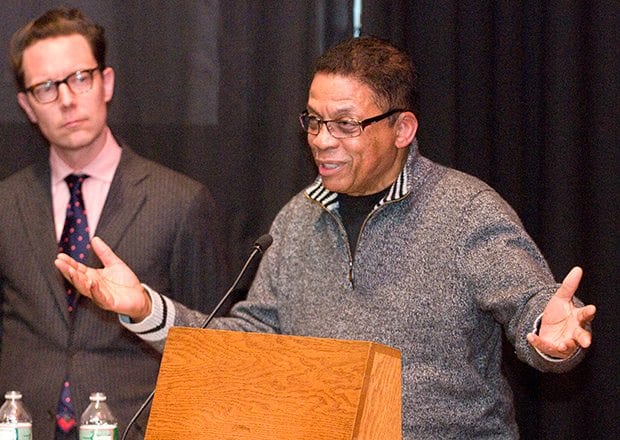

“The Spook Who Sat By the Door” — a 1973 political action film depicting a black, ex-CIA agent who leads an armed insurrection against the U.S. military — made a brief splash on the national screen.
Perceived as “too radical” by the Hollywood establishment, it was pulled from distribution after a week-long run and, in the following decades, relegated to underground cult status among black intellectuals.
A casualty of the film’s near disappearance was Herbie Hancock’s smoldering jazz-funk score.
Hancock, currently an artist in residence at Harvard University, spoke at a screening of the film Monday.
As he reflected back, Hancock seemed amused by the creative experience that displayed his budding genius.
“I don’t know how I was picked to [write the score] for this movie,” Hancock said during a discussion after the movie was screened. “I had maybe had two records out at the time. I was playing around with Miles Davis at clubs at the time.”
Noting the centrality of music to film, Hancock waxed didactic.
“You really can’t watch a movie without music,” said Hancock added. “Just try it.”
Considering the subversive intentions of “Spook” Hancock’s score is innovative and indispensable. Like the movie’s bold themes, the film’s music score was aggressive and forward-looking.
“”I liked the idea of using new instruments and new sounds. Everything before this was with acoustic instruments. I remember wanting to mix synthesizers with orchestral instruments [for this movie].
The results remain stunning. The music in “Spook” give scenes a sense of drive and sustained tension, using jazz “improvisation” and “funk” as vehicles. The music also discloses the tension of the characters and gives testament to the pulsating black ideology at the time.
“They thought this film could be very dangerous,” said Hancock about the subversive themes in “Spook,” which depicted a neighborhood gang at one point detonating a bomb in the mayor’s office and taking over a radio station for the purposes of racial payback.
A musical radical and agitator then, Hancock is now an American sage. He is in the midst of delivering a six-part series of lectures about jazz and culture called the “Ethics of Jazz” for the 2014 Norton Lectures at the Mahindra Humanities Center at Harvard.
On Feb. 27, Hancock will speak on “Cultural Diplomacy and the Voice of Freedom” in Cambridge.
Ever mindful of self-expression and creation, Hancock has developed a clear view of his music and soulful aspiration more broadly.
“The point [of life] is to always build up. Freedom is the core of your being [and] is the goal of every human being weather they know it or not,” he said.






